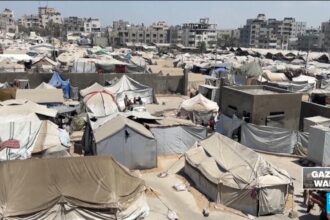The latest round of ceasefire negotiations between Israel and Hamas collapsed dramatically yesterday as Israeli and American delegations abruptly departed Cairo, citing Hamas’ “unacceptable” response to what was characterized as a final proposal. The sudden breakdown deals a devastating blow to diplomatic efforts that many hoped would end the ten-month conflict that has claimed over 40,000 Palestinian lives and left Gaza in humanitarian crisis.
“Hamas once again demonstrated its lack of serious commitment to reaching an agreement,” a senior Israeli official told me on condition of anonymity, as they were not authorized to speak publicly. “Their response included demands that fundamentally contradict the security parameters that Israel cannot compromise on.”
The proposal, brokered by Egypt, Qatar, and the United States, reportedly included a phased ceasefire, the gradual withdrawal of Israeli forces from populated areas in Gaza, and the exchange of Israeli hostages for Palestinian prisoners. According to CO24 World News diplomatic sources, Hamas introduced last-minute demands regarding specific implementation details that Israel deemed unacceptable.
Hamas spokesman Osama Hamdan countered these claims, telling Al Jazeera that the movement had “shown flexibility” while Israel “continues to obstruct any real progress.” Hamdan insisted that Hamas simply sought “guarantees that Israel would honor its commitments,” pointing to previous collapsed agreements.
The diplomatic fallout has been swift. U.S. Secretary of State Antony Blinken, who had invested significant political capital in the negotiations, expressed deep disappointment. “We came incredibly close to an agreement that would have brought relief to civilians in Gaza and the return of hostages to their families,” Blinken stated at a press conference in Washington.
International reaction has been one of growing alarm. UN Secretary-General António Guterres called the breakdown “a tragedy for civilians caught in this conflict,” while urging parties to return to the negotiating table. Meanwhile, humanitarian organizations operating in Gaza warn that conditions continue to deteriorate, with critical shortages of medical supplies, food, and clean water.
This collapse comes at a particularly volatile moment in the Middle East. Tensions between Israel and Hezbollah along the Lebanon border have escalated significantly, while Iranian threats of retaliation for the assassination of Hamas political leader Ismail Haniyeh in Tehran remain unresolved. Regional analysts speaking to CO24 Politics warn that the failed talks could trigger wider regional escalation.
Financial markets have reacted nervously to the news, with oil prices climbing 2.3% on fears of regional instability. According to CO24 Business analysis, prolonged conflict threatens to further disrupt shipping routes and energy markets already under pressure from various geopolitical tensions.
Egyptian mediators have indicated they will continue efforts to revive the talks, though optimism is in short supply. “We’re looking at a situation where both sides appear increasingly entrenched in their positions,” explained Dr. Sarah Mahmoud, Middle East policy expert at the University of Toronto. “The space for compromise is narrowing with each failed negotiation round.”
For Gaza’s civilian population, the collapse of talks means the continuation of what the World Health Organization has called “catastrophic living conditions.” With winter approaching and infrastructure devastated, humanitarian workers fear a deepening crisis.
As regional tensions escalate and suffering continues unabated, one question looms large: If this “final proposal” has failed, what diplomatic path remains that could possibly bridge the seemingly insurmountable divide between the warring parties?
























